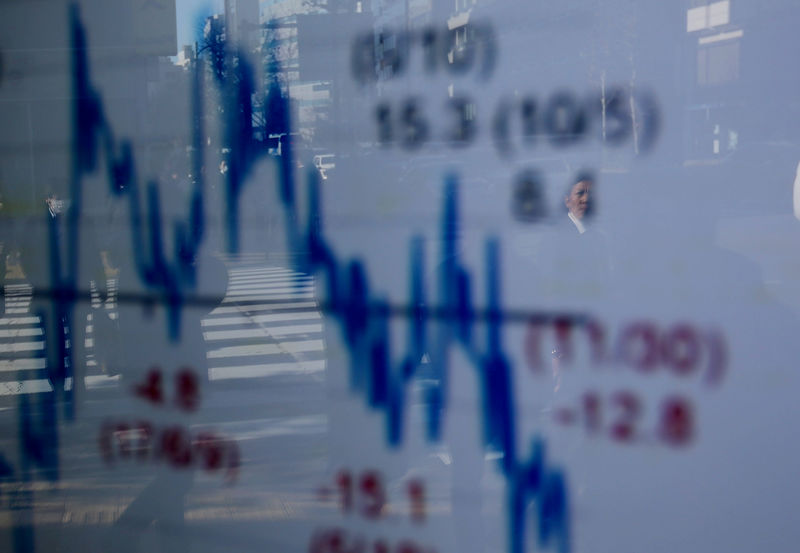This post was originally published on this site
https://i-invdn-com.akamaized.net/trkd-images/LYNXMPEFB801U_L.jpg © Reuters. A man is reflected on an electronic board showing a graph analyzing recent change of Nikkei stock index outside a brokerage in Tokyo
© Reuters. A man is reflected on an electronic board showing a graph analyzing recent change of Nikkei stock index outside a brokerage in TokyoBy Tomo Uetake
SYDNEY (Reuters) – Asian stocks edged up on Monday, catching some of Wall Street’s momentum after surprisingly strong U.S. jobs data, although regional gains were capped by concerns about China’s economic slowdown due to the prolonged Sino-U.S. trade war.
Japan’s benchmark Nikkei () added 0.33% while MSCI’s broadest index of Asia-Pacific shares outside Japan () gained 0.27%. China’s Shanghai Composite () stood flat and so did Hong Kong’s Hang Seng ().
European shares are expected to give up some of the gains made on Friday after the U.S. payrolls data, with pan-European Euro Stoxx 50 futures () down 0.14%, German DAX futures () slipping 0.04% and futures () losing 0.35%.
Wall Street rose to near record highs on Friday on the strong jobs data and some signs of optimism about the U.S.-China trade talks, with the benchmark S&P 500 () closing within 0.2% of its peak set in late November.
U.S. job growth increased by the most in 10 months in November as the healthcare industry boosted hiring and production workers at General Motors (NYSE:) returned to work after a strike, in the strongest sign that the world’s largest economy is in no danger of stalling.
“This economy is still climbing and shattering the records for longevity,” said Chris Rupkey, chief financial economist at MUFG Union Bank. “Right now, the clouds of recession still remain well offshore despite troubled economies elsewhere in the world and a trade war.”
Beijing hopes that it can reach a trade agreement with the United States that satisfies both sides as soon as possible, China’s Assistant Commerce Minister Ren Hongbin said on Monday.
Top White House economic adviser Larry Kudlow said on Friday that a Dec. 15 deadline is still in place to impose a new round of U.S. tariffs on Chinese consumer goods, but President Donald Trump likes where trade talks with China are going.
Still, investors think things could change if trade tensions escalate further, especially if Trump goes ahead with the planned tariffs on some $156 billion worth of products from China in mid-December.
The market has been largely working on the assumption that those tariffs, which cover several consumer products such as cellphones and toys, will be dropped or at least postponed, given that Washington and Beijing agreed in October to work on a trade deal.
Meanwhile, China’s exports shrank for the fourth consecutive month in November, sending shivers through a market already concerned about damage being done to global demand by the trade war.
But growth in imports was seen as a possible sign that Beijing’s stimulus efforts over the last two years were helping to stir demand.
“Although the trade data did not have much impact, concerns about slowing growth and a lack of government stimulus are capping the Chinese shares’ upside,” said Naoki Tashiro, president of TS China Research.
“Yet chip-related shares are doing well, suggesting investors are still positive on the outlook of Sino-U.S. trade talks overall.”
U.S. Treasury yields climbed on the strong employment report, with benchmark 10-year notes rising to 1.843% ().
The Federal Reserve’s Open Market Committee (FOMC) kicks off its two-day policy meeting on Tuesday. The central bank is expected to highlight the economy’s resilience and keep interest rates on hold in the range of 1.50% to 1.75%.
Analysts said the much better-than-expected jobs report offset mixed signals from recent economic data and validated the Fed’s wait-and-see stance on interest rates after three “insurance cuts” this year.
Oil prices retreated but hovered near recent peaks after OPEC and its allies agreed to deepen output cuts by 500,000 barrels per day in early 2020.
U.S. West Texas Intermediate (WTI) crude () slipped 0.4% to $58.94 per barrel, still not far from Friday’s 2-1/2-month high of $59.85 per barrel, while Brent futures () were down 0.3% at $64.21 per barrel.
In the currency market, the dollar maintained a firm tone on Monday, with the against a basket of major currencies () standing at 97.648 and the euro changing hands at $1.1061 (), both little changed on the day.
Against the Japanese yen, the dollar was last traded at 108.59 yen , flat on the day.
Elsewhere, the British pound rose to as high as $1.3180 , its highest in seven months. Versus the euro, the currency hit a 2-1/2-year high of 84.07 pence per euro () on Monday.
Sterling has been bolstered by expectations that Prime Minister Boris Johnson’s Conservative Party will win an outright majority in the upcoming election on Thursday, thereby ending a hung parliament and political paralysis on Brexit.

